USCCB
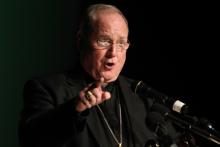
NEW YORK — Walk the streets of Manhattan, especially around St. Patrick’s Cathedral, and ask passersby about Cardinal Timothy Dolan and two things stand out: one, they know who you’re talking about, and two, they like him. Often love him.
Both responses are unusual in the U.S. today: generally, Catholic churchmen are either interchangeable faces to the public, or, if they are known, it’s because of an unflattering headline.
Now Dolan’s extraordinary visibility and popularity are being cited as factors that could make him the first American with a realistic shot at being elected pope when the College of Cardinals gathers in March to elect a successor to Benedict XVI.

The nation’s Catholic bishops on Thursday rejected the Obama administration’s latest proposals to broaden accommodations for religious groups in regulations that require insurance companies or employers to provide free birth control coverage.
The administration last week released a long-awaited compromise for faith-based employers that have religious objections to offering health insurance that could be used by employees to access contraceptives and sterilization.
Yielding to demands by the bishops and other critics, the new accommodation contained a more expansive definition of what constitutes a religious group.
It also detailed how faith-based institutions that may not be exempt – especially religiously affiliated hospitals and universities – would be shielded from any involvement in providing contraceptive coverage; under the new rules, the insurance companies themselves would arrange that with the individual employee.
But New York Cardinal Timothy Dolan, president of the U.S. Conference of Catholic Bishops, said the proposals fail to address or ease all of the hierarchy’s concerns, and said the bishops would continue to press ahead with efforts to overturn the mandate in court.

ST. LOUIS -- As Drew Burkemper got up to preach, the weight of his task was evident. His classmate at Kenrick-Glennon Seminary, Adam Maus, had just pretty much killed it.
Like Burkemper, Maus and other Catholic seminarians were told to prepare and deliver to his class a homily for an imaginary event.
Maus’ scenario had been a wedding between a 42-year-old bride with four children and her groom, who had recently returned to the Catholic Church. The nine other seminarians in the room loved his approach, showering him in glowing feedback.
Burkemper was up next, faced with a preaching scenario that would challenge any 23-year-old priest-to-be. His homily was for a marriage between a Catholic man and a Jewish woman.
As he began, he worked hard on his delivery, as his professor had taught him. "Father Wester is big on delivering the homily,” Burkemper said later. “Not just reading it.”
The Rev. Don Wester, pastor of All Saints Catholic Church in St. Peters, Mo., is Kenrick’s lecturer of homiletics -- the art of preaching.

BALTIMORE — The Catholic bishops gathered here for their annual meeting couldn’t agree on a statement on the economy on Tuesday morning, but with a unanimous voice vote that afternoon they easily backed a measure to push sainthood for Dorothy Day, whose life and work were dedicated to championing the poor.
Indeed, it was a remarkable moment for the reputation of Day, one of the most famous figures in 20th-century Catholicism.
Born in Brooklyn in 1897, Day lived a bohemian life in New York City in the 1920s while working as a leftwing journalist. She endured a failed marriage, a suicide attempt, and had an abortion when suddenly, after the birth of her daughter, she converted to Catholicism.
That decision confounded her literary friends but launched her on a new path of activism and piety.
BALTIMORE — A divided Catholic hierarchy on Tuesday failed to agree on a statement about the economy after a debate that revealed sharp differences over the kind of social justice issues that were once a hallmark of the bishops’ public profile.
The defeat of the document, titled “The Hope of the Gospel in Difficult Economic Times,” followed an hour of unusually intense debate among the 230 bishops gathered here for their annual meeting. It left many of them openly frustrated that the prelates have not made a joint statement about the nation’s economic woes four years after the recession hit.
“This document is dead,” New York Cardinal Timothy Dolan, president of the U.S. Conference of Catholic Bishops, said with obvious disappointment as he brought the gavel down on the debate after it failed to secure the two-thirds majority needed for passage.
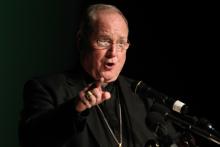
BALTIMORE — After sweeping setbacks to the hierarchy’s agenda on Election Day, New York Cardinal Timothy Dolan on Monday told U.S. Catholic bishops that they must now examine their own failings, confess their sins and reform themselves if they hope to impact the wider culture.
“That’s the way we become channels of a truly effective transformation of the world, through our own witness of a repentant heart,” Dolan, president of the U.S. Conference of Catholic Bishops, told the 250 bishops gathered here for their annual meeting.
“The premier answer to the question ‘What’s wrong with the world?’ is not politics, the economy, secularism, sectarianism, globalization, or global warming … none of these, as significant as they are,” Dolan said, citing many of the issues that have become favorite targets of the hierarchy.
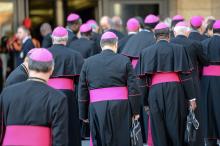
As the bishops gather in Baltimore this week for their annual meeting, they like everyone else in the country will be talking about last week’s election. The U.S. Catholic bishops took a beating at the polls. Not only was President Obama reelected, despite their attacks on him, the bishops also lost on state referendums on same-sex marriage.
Like all Americans, the bishops have a constitutional right to participate in the political process. They can debate the issues, criticize candidates and publicly express their views. They can even endorse candidates as long as they don’t do it on church property and don’t use church funds in supporting a candidate or party. In fact, they can even run for president as did Rev. Pat Robertson and Rev. Jesse Jackson. The U.S. Constitution does not forbid this; Roman Catholic canon law forbids it.
But what is constitutional is not always effective or prudent. Clearly the political strategy of the bishops is not working. A majority of Catholics voted for Obama and gay activists won every referendum. The Missouri and Indiana Republican senatorial candidates, who took the toughest positions on abortion, were also defeated when the Republicans were expected to win these races.
So where do the bishops go from here?

A number of Roman Catholic bishops are making forceful last-minute appeals to their flock to vote on Election Day, and their exhortations are increasingly sounding like calls to support Republican challenger Mitt Romney over President Barack Obama.
The most recent example: a letter from Illinois Bishop Daniel Jenky accusing the administration of an unprecedented “assault upon our religious freedom” and implying that Catholics who pull the lever for Democrats who support abortion rights are like those who condemned Jesus to death.
“Since the foundation of the American Republic and the adoption of the Bill of Rights, I do not think there has ever been a time more threatening to our religious liberty than the present,” Jenky writes in the letter, which he ordered priests in his Peoria diocese to read at all Masses on Sunday.
In the letter, Jenky blames Obama and the Democratic majority in the Senate for trampling on the Catholic Church’s rights and moral convictions by requiring health insurers to provide contraception coverage. Jenky also compares abortion rights supporters to the Jewish crowd in Jerusalem that pledged loyalty to the Roman Empire and demanded that Pontius Pilate crucify Jesus.
“For those who hope for salvation, no political loyalty can ever take precedence over loyalty to the Lord Jesus Christ and to his Gospel of Life,” Jenky writes.
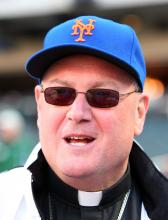
By tradition, the storied Al Smith Dinner has provided a few hours of comic relief from the angry volleys of the campaign trail – a white-tie charity banquet held in the weeks before Election Day, hosted by the archbishop of New York and featuring speeches by the two presidential candidates on the condition that they lob nothing more than good-natured jibes.
But the Catholic hierarchy’s fierce feud with President Obama, abetted by the increasingly sharp tone of the 2012 elections, is threatening to invade this demilitarized zone and give New York Cardinal Timothy Dolan a case of pre-dinner agita.
Dolan has reportedly extended an offer to Obama (as well as his Republican opponent, Mitt Romney) to attend this year’s dinner at the Waldorf-Astoria, scheduled for Oct. 18, and the president has accepted. That has mobilized abortion opponents, who view Obama as the worst thing since Roe v. Wade and an enemy of religious liberty because of his administration's controversial birth control mandate.
The Rev. Frank Pavone, head of Priests for Life, a leading abortion opponent based in Staten Island, said on Aug. 6 that “the polite putting aside of differences for a while amounts to scandal.”
A new poll shows that American Catholics tend to agree with their bishops’ concerns that religious liberties are at risk in the U.S.
Nevertheless, Catholics seem to be warming to President Obama, even as the bishops lambaste his administration in their fight to roll back a federal mandate that requires employers — with some exceptions — to cover birth control in their health plans.
The poll, released on Aug. 1 by the Pew Forum on Religion & Public Life as the contraception mandate took effect, found that among Catholics who are aware of the bishops' protests, 56 percent say they agree with the bishops’ concerns, as opposed to 36 percent who disagree.
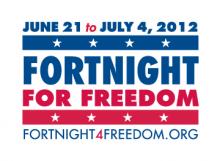
On June 21, Catholics across the country will amplify what is an already loud outcry from the hierarchy over the federal government's so-called contraception mandate.
With rallies, marches, lectures and special publications, the U.S. Catholic Bishop's Fortnight for Freedom campaign will seek to galvanize Catholic opposition to President Obama's proposed mandate to require employers — including religious institutions — to provide free contraception insurance coverage to employees.
But while Catholic leaders frame the events as a fight for religious liberty, critics see signs of political partisanship and electioneering. Questions over the financing of the bishops' campaign have caused those suspicions to multiply.
"The activities around the Fortnight for Freedom cost money," said Steve Schneck, director of the Institute for Policy Research & Catholic Studies at the Catholic University of America in Washington. "What groups are paying for this, and what's the accountability for that money?"
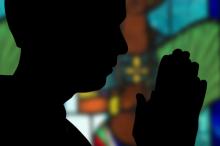
Amid continuing headlines about cover-ups of child abuse in the Catholic Church, an oversight board of lay Catholics on June 13 warned the nation’s bishops that they must follow their own policies against abuse more rigorously if they hope to restore their fragile credibility.
“If there is anything that needs to be disclosed in a diocese, it needs to be disclosed now,” Al J. Notzon III, head of the bishops’ National Review Board, told some 200 prelates gathered in Atlanta for their annual spring meeting. “No one can no longer claim they didn’t know.”
The meeting of the U.S. Conference of Catholic Bishops comes 10 years after the hierarchy met in Dallas and passed a series of reforms to respond to a siege of bad publicity about sex abuse by priests. It also comes as a jury in Philadelphia weighs the fate of a high-ranking priest who's facing criminal charges of concealing abuse by clerics, and as a bishop from Missouri awaits trial on charges that he failed to report a suspected child molester to authorities.
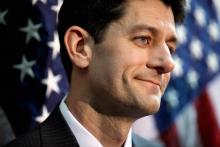
A week after House Budget Committee Chairman Paul Ryan claimed his Catholic faith inspired the Republicans' cost-cutting budget plan, the nation’s Catholic bishops reiterated their demand that the federal budget protect the poor, and said the GOP measure “fails to meet these moral criteria.”
That and other strongly-worded judgments on the GOP budget proposal flew in a flurry of letters from leading bishops to the chairmen of key congressional committee.
The letters to Capitol Hill were highlighted in a Tuesday (April 17) statement from the U.S. Conference of Catholic Bishops that came after Ryan, a Wisconsin Republican and rising conservative hero, told an interviewer last week (April 10) that his fiscal views were informed by Catholic social teaching.
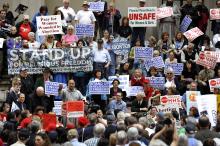
The nation’s Catholic bishops are calling on the faithful to pray and mobilize in a “great national campaign” to confront what they see as a series of threats to religious freedom, and they are setting aside the two weeks before July 4 for their “Fortnight for Freedom” initiative.
The exhortation is contained in a 12-page statement released Wednesday (April 12) by the bishops’ Ad Hoc Committee on Religious Liberty, and its chief concern is the Obama administration’s proposal to provide contraception coverage to all employees with health insurance, including those who work for religious groups.
The statement represents the hierarchy’s latest effort to overturn that policy, and it includes an explicit threat of widespread civil disobedience by the nation’s 67 million Catholics.
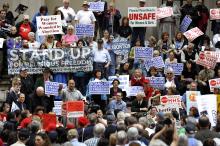
The nation’s Catholic bishops say the Obama administration’s proposed revisions to a mandate that requires insurers to provide birth control coverage are still unacceptable and even “radically flawed" -- signaling a long drawn-out election-year fight between the White House and the Catholic hierarchy.
The bishops also say that they will continue to try to overturn the contraception regulations in Congress and the courts even as the bishops carry on negotiations with the White House.
The critical judgments on the government proposals, which were published by the U.S. Department for Health and Human Services on March 16, are contained in an internal, two-page March 29 memo from the U.S. Conference of Catholic Bishops. The memo’s contents were first reported Tuesday (April 3) by Catholic News Service.

Remember Rep. Paul Ryan’s 2011 budget, The Path to Prosperity? Well, it’s baaa-aaack — and this time the path is smoother and wider and offers a quicker trip to judgment.
Christianity and most of the world’s faith traditions explicitly demand protection for the poor and the preservation of the lives and dignity of all. Well, the Chair of the House Budget Committee, Ryan, high-tails it down his Path, budget rolled in-hand, in the exact opposite direction from those moral commitments.
Bob Greenstein, president of the Center on Budget and Policy Priorities (CBPP), concluded that the Ryan budget “is Robin Hood in reverse — on steroids. It would likely produce the largest redistribution of income from the bottom to the top in modern U.S. history and likely increase poverty and inequality more than any other budget in recent times (and possibly in the nation's history)."
Any responsible budget plan requires a balanced approach that would both increase revenue and reduce spending. This proposal would cut taxes, merely hope for revenue, increase military spending, and slash most everything else that isn’t protected by large corporate interests.
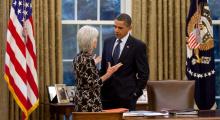
The Obama administration is offering to expand the number of faith-based groups that can be exempt from the controversial contraception mandate, and proposing that third-party companies administer coverage for self-insured faith-based groups at no cost.
At its heart, the newest offering from the White House would allow religious groups -- dioceses, denominations and others -- to decide which affiliated institutions are "religious" and therefore exempt from the new requirement that employers offer free contraception coverage as part of employee insurance plans.
The proposals are an effort by the administration to blunt criticisms of the controversial regulation, especially by the nation's Catholic bishops, who have been at loggerheads with the White House since President Obama announced the contraception mandate in January.
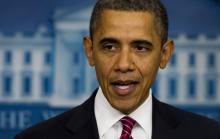
The nation's Catholic bishops have again voiced doubts about the Obama administration's plans to modify a mandate for employers to provide free birth control coverage, vowing to press a new campaign to rally Americans to defend religious freedom.
Despite their skepticism, a statement issued Wednesday (March 14) by leading bishops at the end of a closed-door meeting in Washington was notable for lacking the "war on religion" rhetoric that has characterized many of the hierarchy's broadsides against the White House.
While the bishops called the proposal unveiled by President Obama on Feb. 10 "an unspecified and dubious future 'accommodation,'" they also stressed that they are willing to "accept any invitation to dialogue" with the White House.

WASHINGTON--A vocal contingent of Republican presidential candidates and church leaders are railing against the Obama administration's ``war on religion,'' but most Americans can't seem to find the fight.
A majority (56 percent) of Americans say religious liberty is not threatened in the U.S., according to a new poll released Thursday (March 15) by the Public Religion Research Institute, which conducted the survey in partnership with Religion News Service.
The poll, which asked a wide range of questions, also found significant support for same-sex marriage.
Even though Catholic bishops are leading the charge that the new White House mandate requiring insurance plans to cover birth control for employees is a threat to religious liberty, Catholics reject -- by a 57 to 38 percent margin -- the idea that religious liberty is under siege.

BRIDGEPORT, Conn. — The Catholic bishop leading the push against the White House's contraception mandate says the bishops hope to restart contentious talks with the Obama administration, but cautioned that church leaders "have gotten mixed signals from the administration" and the situation "is very fluid."
Bishop William E. Lori of Bridgeport, Conn., who chairs the religious liberty committee of the U.S. Conference of Catholic Bishops, told Religion News Service that Catholics have to stay united if the hierarchy is to have any chance of prevailing in negotiations with the White House.
Ever since President Obama bowed to growing pressure and shifted the mandate to provide contraception mandate to insurance companies and away from religious employers, the White House has been hosting talks with various religious groups about a plan to modify the regulation.
Catholic institutions like hospitals, universities and social service agencies are most directly affected by the regulation because they are the biggest faith-based employers. They have also been much more amenable to the Obama accommodation than have the bishops.
Many bishops are upset with Catholic groups that have dealt independently with the administration, and some have also accused the administration of trying to divide the church.